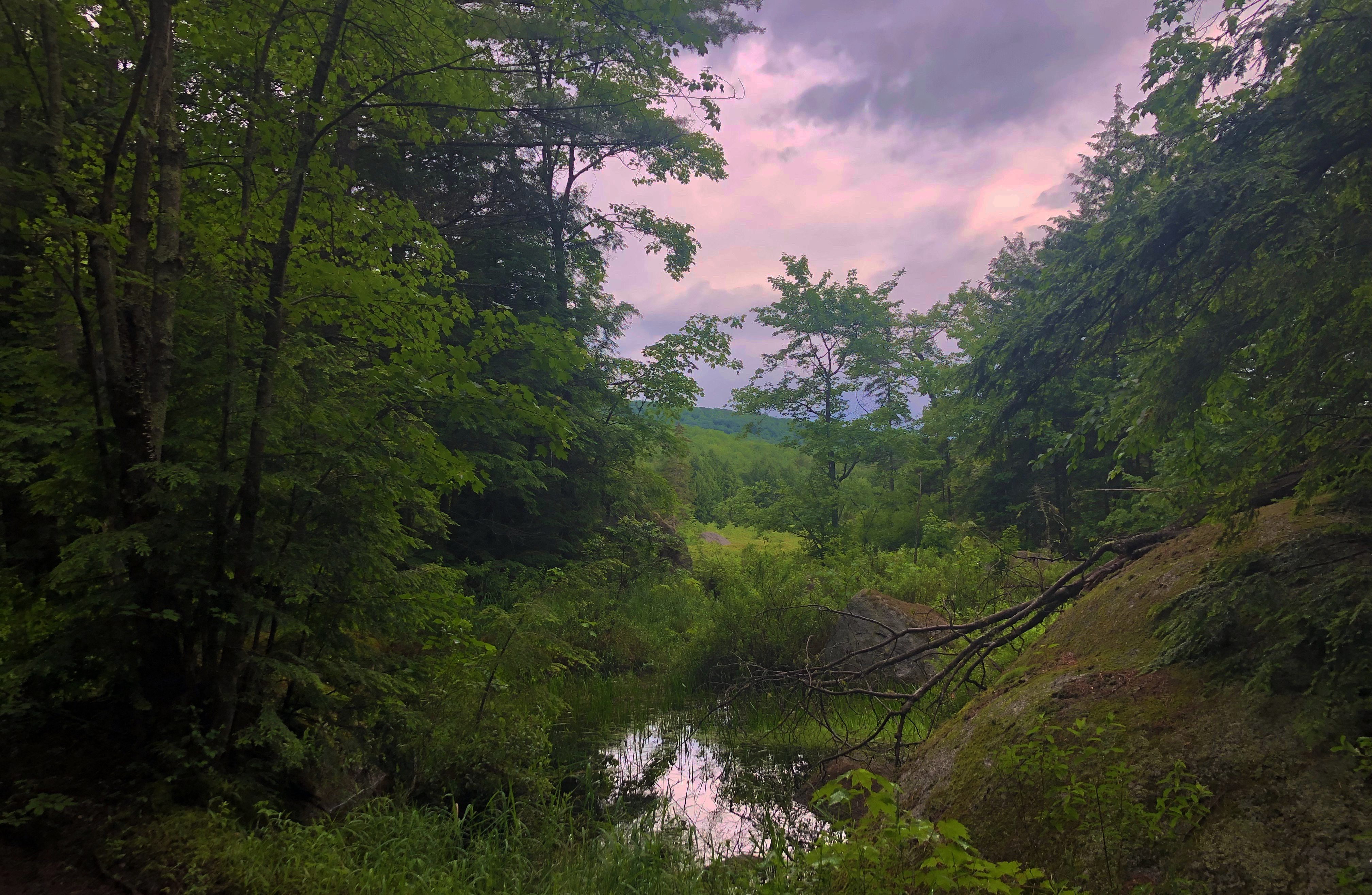I clabber down the old tote road towards the red pine forest, leaning on my staff, skirting boulder-strewn ruts and small gullies carved out by two days of heavy rain. It is only a mile or so from our cabin, still, my wife makes me wear a pouch with an iPhone and an epi-pen. I once poked a yellow jacket nest with the stub of my staff and had to run like an enraged bear through the mad tangles of this New Hampshire forest.
I am wiser now.
I don’t know why I am drawn to this daily amble. There is nothing special here: miles of mossy stone walls slowly sinking under the detritus—a hundred years or more of leaf, moss and deadwood, edging what once were fields, overtaken now by massive white pine, ashes weakened by blight, red oaks and sugar maples; The floor is an impenetrable bramble of gnarly bush, ferns and bog. Here and there are old foundations, small and square, meticulously laid, dug into scrabbly hillsides, yet, somehow, hardy, cursing men lived in the rough cabins and spent their days cutting timber, carving fields out of impossible ground, wrestling massive granite stones to set the lines between them.
My epi-pen and phone hang on me like effete sophistry. I do not even recognize what bird is calling whom? Certainly not me—this morning intruder stopping by the great swamp. I scan the shores for moose. I know they are there, along with black bear, bobcats and deer, fisher cats, skunks and raccoons. It is a fool’s errand to think they would reveal what they know or where they lie at daybreak.
They, too, must have their walls.
The deer flies attack me like I am their last supper, but I learned long ago to dress for a summer hike as if it is mid-winter: heavy boots, gloves, denim—a shroud of mosquito mesh covering my head, tucked deliberately into my sweaty breast. They do not bother me, incessant as they are, any more than any other swatch of warm flesh breathing slowly in this still morning air, lingering with low fog.
If not for these flies I would have to share this trail with gobs of humanity bent on an easier hike. They will come in the fall when the weather is cool and mad dashes of color are ripped from the trees and soften this worn trail.
I only once met another hiker—an old woman with a willow basket and an old camp saw. She seemed unnerved to see me clothed in my normality and revealed in a wispish voice: “I am here to find some black birch to make my tea.” I offered her some extra mesh, but, “They do not bother me,” was all she said. A few steps later I looked back, and she was gone. The mystic in me saw some ancient Margaret searching for her illicit lover, Tamlin, in this lonely bower—but she probably just strode away faster than the flies could fly.
I’ve never seen her again.
At a certain point the tote road splits: to the left it cleaves around the massive swamp into which empties innumerable freshets, springs and small brooks, The springs of water that fill Black Pond—black as tea, steeped in a broth of bitter New England leaf.
To the right it arcs into a smaller trail that runs many miles inland into forgotten land. Another small trail wends three more miles to Trout Pond. Every day I remind myself to someday bushwhack that overgrown path, just so I can be one of the few who can say, “I have been there.”
But it is the Red Pine Forest that calls me. The vague entrance marked by a mossy boulder. I duck under arches of young beech, saplings that will never grow old in this forbidden place. The red pines are an odd anomaly, planted in straight lines by some dreamer plotting a handsome fortune In telephone poles—seemingly hundreds of piercingly straight spires interlaced by an equal number of deadened timber, holed by woodpeckers and jays—leaning and hanging, ominous widow-makers ravaged by wind and storms, who died trying. I sneak in as the sun is rising, bending under an arc of beech saplings into the mysterious grove. Like the immigrant red pines, I feel strangely out of place—as if I, too, am not welcome. I am Narcissus staring into his vain pool of water, drawn and entranced by fleeting, corporeal beauty, but unlike the red pines I am not trapped here, stoic to the last.
I watch the streams of light bolt in flashes of geometric entropy scanning the soft needled floor. I feel a murmur of wind and a cackling jay urging me quickly to leave. And so I clabber back home along the old tote road, coddled by deer flies, swarmed by mosquitoes, kindred to the moose and the old Finns of these woods, accepting there are things I may never know.


